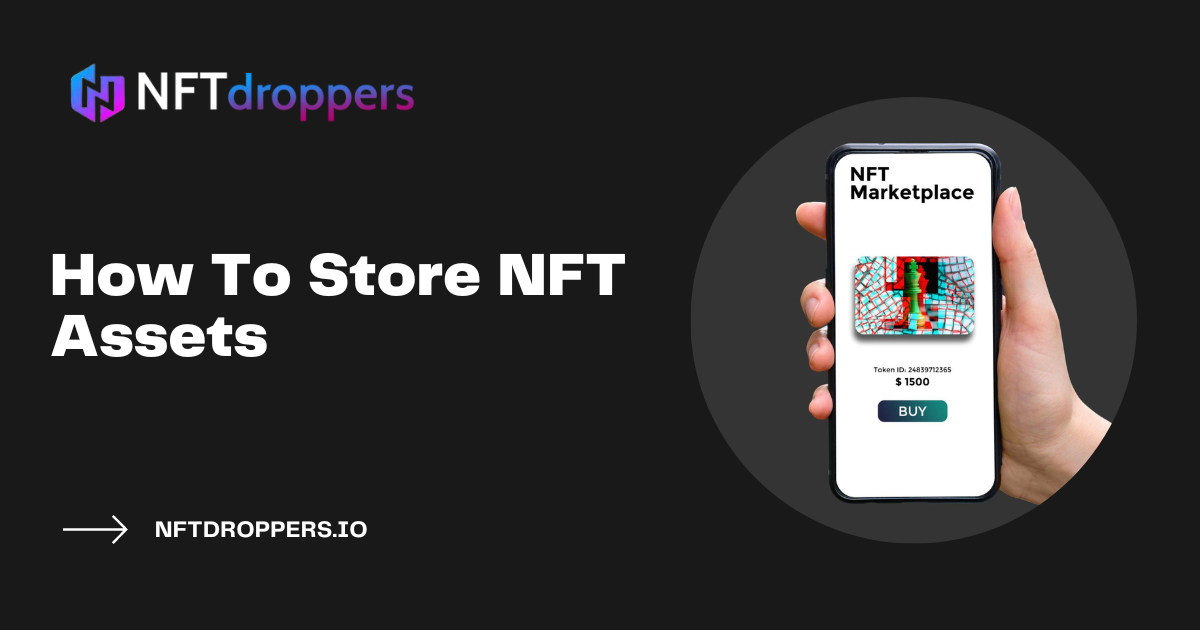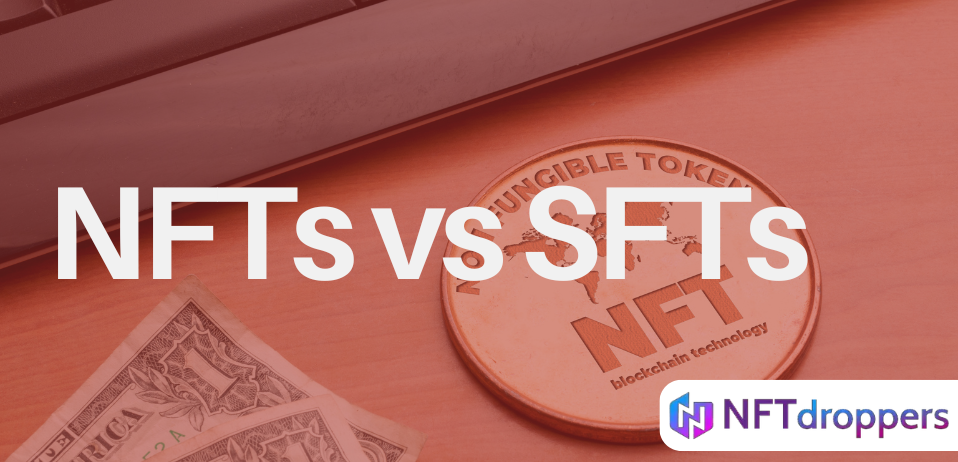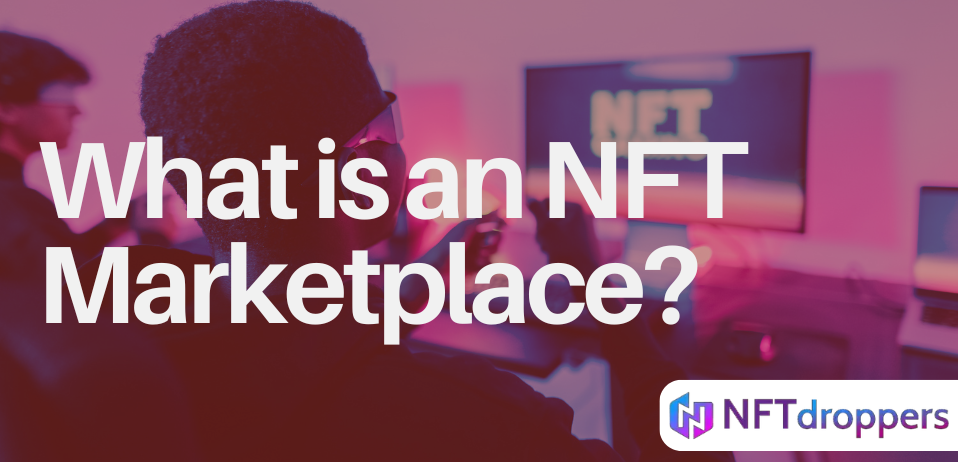At NFT Droppers, we provide the latest crypto news, in-depth project information, and comprehensive market insights. Launched in 2022, our platform covers new token launches, market trends, and detailed reviews of crypto and NFT projects. We offer reliable ratings based on 70+ evaluation factors, including tokenomics, roadmaps, and team authenticity. Whether you’re an investor or a crypto enthusiast, NFT Droppers keeps you informed with accurate, up-to-date information and expert analysis.
How To Store NFT Assets- Beginner Guide

Table of Contents
If you own a physical artwork for millions of dollars, it is essential to store it safely. For that, the owners need to choose the right place. This same principle applies to NFTs. If you hold an NFT asset, you must learn how to store the NFTs assets safely to avoid fraudulent activities and losing your million dollars.
The NFT tokens are not just artworks; they can represent certain things like artistic images, video identity documentation, music videos, car ownership, house ownership, etc. Before the intervention of Blockchains, digital assets could easily be replicated and distributed.
Due to this, there needs to be knowledge of where the digital assets are located, making them worthless. But today, due to blockchain, artists are allowed to create and validate the original data through which they can easily manage the assets without being a part of a trustless environment.
However, this breakthrough has represented a significant step toward the ownership of digital assets. Due to this, the value of NFT assets is booming. As a result, storing NFT’s property has become vital to avoid theft or scams.
Why is storing NFT important?
NFTs are used in various forms. From intelligent contracts representing ownership of digital assets, data, and physical goods, a user can use NFTs for multiple applications. NFTs can describe the relationship between two or more groups or parties.
Therefore, keeping the value in mind, the security of NFTs assets is at high risk. Over the last few years, NFTs have become highly valuable and are rare assets that have attracted thousands of investors. Today, these investors have become the target of hackers willing to steal digital networks.
A few months ago, hackers stole NFT’s assets of thousands of dollars from the Nifty Gateway marketplace. The platform then blamed the consumers for the lack of two-factor authentications, which allowed the hackers to access and steal the information. Although the company’s security wasn’t compromised, some issue was raised on how safe and secure the NFTs are and whether storing the digital item in a third-party solution is safe. Well, it is believed to be safe.
This is because these wallets have become beneficial for storing other crypto assets. Although these wallets have worked only for crypto assets, with the intervention of NFTs, it is expected that different types of crypto wallets can be created for storing NFT assets.
How to store NFT assets?
You can store NFTs in three different ways. However, when evaluating the NFT storage options, it is also essential to guarantee the interoperability of the multiple chains within the marketplace. It is generally used to purchase and sell NFTs.
Moreover, you must also ensure that the NFT storage wallets offer you high security and come with a user-friendly interface. Therefore, most NFTs are constructed on the Ethereum blockchain, so it is essential to check whether the wallets are compatible with the Ethereum blockchain.
Here are some ways through which you can store NFTs
1. Software wallet
A user will find several types of software wallets through which they can store their NFT assets. Some of these wallets are web-based, while others and mobile-based. These wallets are easy to set up, and one of the top choices of software wallets is Metamask.
These wallets are highly secure for storing digital assets. However, solutions like Metamask are vulnerable to cybercriminals and might have been hacked in the past. That’s why checking whether the application you are accessing is fake or real is essential.
However, the coinbase is creating a helpful marketplace through which users can easily mint, showcase, purchase and manage the NFT assets. Another software wallet through which you can easily store, distribute and integrate NFTs is Enjin wallet.
This wallet has a market cap of $10.3 million. Meanwhile, it also supports DeFi and Ethereum and will soon be declared official NFT storage wallet software. However, the math wallet is differentiated by the native support from over 70 public blockchains.
Advantages of software wallet
The convenient nature of software wallets makes them a suitable option for storing NFTs. However, there are several advantages that a user will receive by opting for software wallets.
- Software wallets are easy to use. If you are a regular trader and opt for NFTs in day conversions, software wallets can be an ideal option.
- It provides quick access to the NFTs through which liquidating the assets becomes relatively straightforward when the market crashes.
- The software wallets are reliable and offer additional web browser extensions that improve the efficiency of your online transactions.
- These wallets are free to use and can be set up quickly.
- Software wallets support multiple chains and decentralized applications.
- The codes used in software wallets are open source, and the developers and other members behind software wallets are testing the codes to find out any in-built faults.
With these benefits, using software wallets to store the NFTs becomes quite convenient.
1. Cold storage Hardware wallets
Hardware wallets are another way to store NFTs assets in a secured hardware device. These wallets contrast with software wallets generally stored on a computer or a mobile device. Hardware wallets are believed to be more secure as they cannot be hacked.
These wallets use two-factor authentications, making it quite difficult for hackers to locate and access your file. Therefore, there are two top hardware wallets that you can try, and these are Trezor and Ledger. However, it is essential to have a digital wallet if you want to store digital assets.
This software application allows you to easily store your private keys, allowing access to the holdings. Moreover, users can opt for physical hardware or online hot wallets. Therefore, no matter which option you’ll pick, the only thing you need to make sure of is that your assets are safe through cold storage.
However, you will find multiple options when opting for the storage of NFT assets. But, it depends upon the budget. You can use a cheaper online platform if an investor has a limited budget.
Otherwise, the users can also opt for expensive hardware wallets. However, it is vital to research the company you have decided to associate with. Make sure they use two-factor authentications to offer high security.
Advantages of hardware wallets
Hardware wallets are a preferable option to store NFTs. If a user opts for cold storage hardware wallets, then there are certain benefits associated with them. Have a look at finding out.
- While storing the NFTs in a hardware wallet, the users need to set an authentic password or private key to help them access their assets. These private keys within the wallets eliminate the risk of storing the NFT directly on the computer.
- These private PIN encryption keys make the devices highly secure and safe.
- Hardware wallets can store multiple digital assets which belong to non-identical blockchain networks.
- These wallets are immune to computer viruses.
- A hardware wallet verifies all the transactions that have taken place, not online.
- The codes that run hardware wallets are open-sourced, and this increases the accessibility and transparency to the developers.
- The teams that run the hardware wallets are trying to improve the codes, which boosts security.
These benefits make hardware wallets an ideal option for storing valuable NFTs.
1. Interplanetary File system (IPFS)
The interplanetary File system is a peer-to-peer protocol in which users can easily store their decentralized NFT assets without any risk of getting hacked. The content identifiers are mainly the hashes connected to the user’s NFT instead of opting for any general HTTP link. The HTTP link can be easily modified and hacked, which has many security issues.
But with IPFS, you’ll not encounter any such issue. The CID will act as a permanent record of the file you own, and if a user creates a new version of their file in IPFS, then the user will get different cryptographic has. That means your file will get a new CID. Therefore, if a cybercriminal produces a fake CID hash, you will be instantly notified by the end of the inappropriate data.
That means the files you have stored on IPFS cannot be changed or censored, and the original file will remain as it was and cannot be overwritten. Besides, if a hacker node provides any CID hash, you will get information by the end of your bogus data. The features of IPFS provide high security, which is an ideal choice for storing NFT assets.
Moreover, this store has a decentralized and distributed design by following and relying on the principle of blockchain. Besides, you can opt for Pinata to store the NFT. It is an IPFS-based NFT wallet that was created in 2018. This wallet holds 45 million files with over 70,000 users.
Even if it is not the most common storage option, it still has a high potential to expand the growth among the developers. This is because of the high-security feature it comes with.
How can you safeguard your NFT assets from hackers?
A hacker can break into your computer system and steal all the information, and the hacker mainly uses social engineering techniques to operate the data. In 2021, the NFT market witnessed dramatic growth, with trading volumes hitting their peaks. The sales of NFT hit $25 billion last year.
Therefore, this jump in demand and value has resulted in scammers and hackers entering the marketplace and stealing the NFT’s assets from investors. That’s why investors should take precautionary measures to secure and prevent data from NFT assets. It includes updated security measures on your social media accounts and using a strongly encrypted password. Hardware wallets are a part of cold storage wallets.
This means that the crypto assets are stored offline in an authorized network. With these wallets, you get safety on your assets, even providing an extra layer of security. Moreover, these wallets also provide backup features in case of the investor losses their device. Meanwhile, there is another wallet-like software through which the data is stored online, but they do not have any private keys.
Software wallets might not be as secure as hardware wallets, but they are convenient. NFTs are the digital assets that are held in the blockchain. These NFTs can be valuable tokens or virtual assets. These digital assets can be hacked quickly if the investors don’t store them properly. In that case, choosing wallets like hardware, software or IPFS can help keep the NFT assets. It is harder for hackers to access the tokens in these wallets as they are encrypted with two-factor authentication.
Moreover, the NFT collectors must conduct diligence to determine the authenticity of the NFTs you purchase. Meanwhile, this will also eliminate the risk of fraud and hacking. Along with it, the collector or investors should also verify that the linked webpage is authentic. Scammers can easily clone a website if it is not secured and still the NFT assets.
So make sure, firstly, you secure the assets with a password and choose a reliable webpage. This way, your NFT assets will be completely safe and secure from hackers.
Also learn more about How To Sell NFT On Wax Wallet
Conclusion
A holder of NFT can easily project their digital assets by storing them in one of the options listed above. Besides, with these wallets, you do not have to worry about the security and safety of the assets. Nowadays, you will find multiple options that fulfil the requirement of every individual.
You can find everything according to your budget, from the most expensive NFTs storage solutions to the cheaper online platform. The fact is that, either expensive or cheap, all the wallets guarantee you a safe environment to store NFT assets.
However, choices like hardware wallets will be expensive but offer enhanced user security that might be good options for investors who hold an appropriate amount of NFT assets.

Disclaimer: The information presented here may express the authors personal views and is based on prevailing market conditions. Please perform your own due diligence before investing in cryptocurrencies. Neither the author nor the publication holds responsibility for any financial losses sustained.
Top Crypto Presales
 Ionix Chain $IONX
Ionix Chain $IONXBEST CRYPTO CASINO
TOP EXCHANGES
CRYPTO PAYMENT GATEWAY
 Crypto Cloud
Crypto CloudBEST HARDWARE WALLET
 Tangem
Tangem Gamdom
Gamdom Stake.com
Stake.com Coins.Game Casino
Coins.Game Casino








